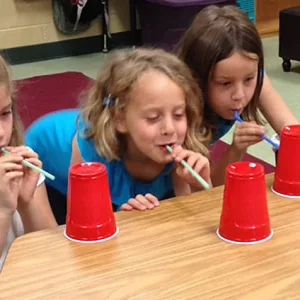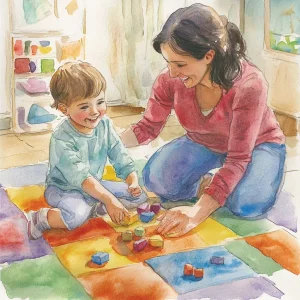Activity
Similar Activities
Outdoor Tea Party and Fix-it Fun for Toddlers
Children’s Age: 2–4 years
Activity Duration: 10 – 25 minutes
Let's create a fun Outdoor Tea Party and Fix-it Station for kids aged 1 to 3. Set up a table and chairs, play tea set, pretend tools, household items for fixing, a picnic blanket, …
Activity Duration: 10 – 25 minutes
Enchanted Tea Party Adventure: A Magical Journey
Children’s Age: 3 years
Activity Duration: 10 – 15 minutes
Join us for a Magical Tea Party Adventure! Enhance your child's play skills, social-emotional growth, and language abilities through a whimsical tea party experience. Gather teacup…
Activity Duration: 10 – 15 minutes
Whimsical Cup Blow Race for Kids
Children’s Age: 4–6 years
Activity Duration: 5 – 10 minutes
The Cup Race Challenge activity is designed to boost teamwork, fine motor skills, and problem-solving in children. You'll need plastic cups, straws, a table, and masking tape to cr…
Activity Duration: 5 – 10 minutes
Musical Journey Through Time and Space - Instrument Exploration
Children’s Age: 3–4 years
Activity Duration: 15 minutes
Embark on a creative musical journey with children aged 36 to 48 months to boost their communication, self-care, and play skills. Use household items as instruments, set up a perfo…
Activity Duration: 15 minutes
Cultural Photo Exploration: World Wonders Journey
Children’s Age: 6–10 years
Activity Duration: 20 minutes
Embark on the "Cultural Photo Exploration" activity to boost children's play skills, cultural awareness, and academic development through an outdoor photography journey. Choose a d…
Activity Duration: 20 minutes
Melodies of Creation: The Musical Painting Adventure
Children’s Age: 2–3 years
Activity Duration: 15 minutes
Engage children aged 24 to 36 months in the Musical Painting activity, promoting creativity and motor development. Provide paper, paints, musical instruments, and lively music for …
Activity Duration: 15 minutes
Magical Animal Sounds Guessing Game Adventure
Children’s Age: 1–1.5 years
Activity Duration: 10 minutes
Explore the "Animal Sounds Guessing Game," perfect for curious toddlers aged 12 to 18 months. This engaging activity enhances play, language, and cognitive abilities. Simply gather…
Activity Duration: 10 minutes
Starry Skies: Rocket Launch Adventure
Children’s Age: 6–10 years
Activity Duration: 25 minutes
"Rocket Launch Adventure" is an outdoor activity that engages children in a fun and interactive experience while promoting communication skills, play skills, and introducing basic …
Activity Duration: 25 minutes
Enchanted Nature Story Stones Adventure in the Forest
Children’s Age: 5–6 years
Activity Duration: 20 minutes
In the Nature Story Stones Adventure activity, children will enjoy creative storytelling with nature-themed stones, fostering imagination, language skills, and teamwork. To begin, …
Activity Duration: 20 minutes
Whispers of the World: Around the World Virtual Adventure
Children’s Age: 7–9 years
Activity Duration: 20 – 30 minutes
Embark on the "Around the World Virtual Adventure," a captivating and educational journey for children to explore various cultures and innovations globally. Through this activity, …
Activity Duration: 20 – 30 minutes
Texture Discovery Sensory Play for Little Ones
Children’s Age: 1–1.5 years
Activity Duration: 10 minutes
Engage your 12 to 18-month-old in a sensory play activity to explore textures and boost cognitive development. Create a safe play area with various textured items like cotton balls…
Activity Duration: 10 minutes
Colorful Objects Sorting Game for Cognitive Development
Children’s Age: 1.5–4 years
Activity Duration: 10 – 15 minutes
This colorful sorting game is designed to boost your child's cognitive skills and nurture their curiosity. Gather safe, colorful objects like blocks or toys from your home. Place t…
Activity Duration: 10 – 15 minutes




























